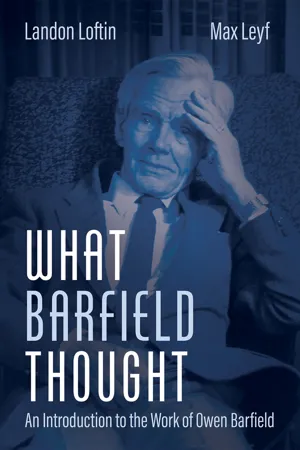
What Barfield Thought
An Introduction to the Work of Owen Barfield
- 126 pages
- English
- ePUB (mobile friendly)
- Available on iOS & Android
About this book
As interest in Owen Barfield grows, we aim to meet the need for a scholarly introduction to his thought. Our primary purpose is to present an overview, analysis, and synthesis of Barfield's most salient ideas in a manner that will be of interest to neophytes and initiates alike. Barfield's work can, at times, be difficult to understand; C. S. Lewis put it well when he described Barfield's style of argument as "dark, labyrinthine, " and "pertinacious." But Lewis ardently promoted Barfield's work because he knew that people who willingly walk in those dim and winding corridors are, in time, richly rewarded by the bright light at their end. We offer the present work in service to those who wish to undertake this adventure. While the present book will help those readers who wish to engage Barfield for the sake of achieving a greater understanding of and appreciation for other writers who have been associated with or influenced by him, we aim first and foremost to present Barfield as a profound and original thinker in his own right.
Frequently asked questions
- Essential is ideal for learners and professionals who enjoy exploring a wide range of subjects. Access the Essential Library with 800,000+ trusted titles and best-sellers across business, personal growth, and the humanities. Includes unlimited reading time and Standard Read Aloud voice.
- Complete: Perfect for advanced learners and researchers needing full, unrestricted access. Unlock 1.4M+ books across hundreds of subjects, including academic and specialized titles. The Complete Plan also includes advanced features like Premium Read Aloud and Research Assistant.
Please note we cannot support devices running on iOS 13 and Android 7 or earlier. Learn more about using the app.
Information
Table of contents
- Title Page
- Acknowledgments
- Introduction
- Chapter 1: Life
- Chapter 2: Language
- Chapter 3: Poetry
- Chapter 4: The Evolution of Consciousness
- Chapter 5: Final Participation
- Chapter 6: Science, Technology, and the Crisis of Meaning
- Conclusion
- Bibliography